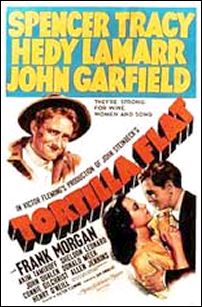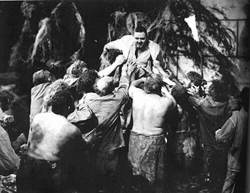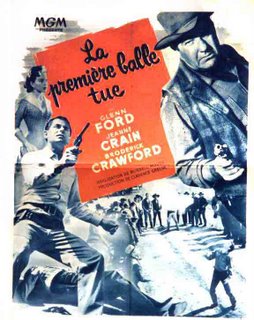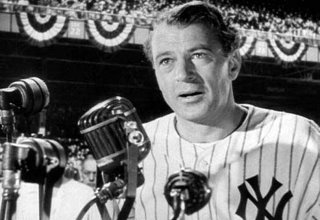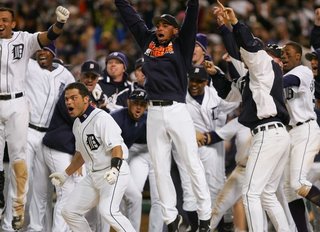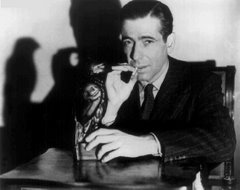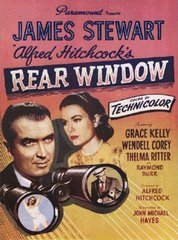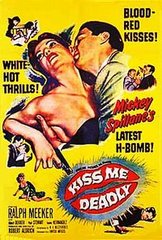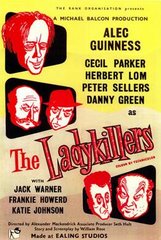Part IIThe Derelict:
So what did you think of Maltese Falcon?
LeaJo:
Well, I liked it! I thought it was a good movie and it was entertaining. It wasn't really what I expected it to be though. I thought there was going to be a lot more action and mystery, but the whole thing felt a little bit more subdued compared to the other mystery movies I'm familiar with. I also thought it was a bit boring at times though. There was a ton of exposition that would go on for long periods of time and I kind of just wanted them to SHOW me what was going on, not just tell me everything. I also liked the ending when Sam turned the girl in, but I was sort of expecting there to be a bigger twist in the end. I don't know why, I just thought there would be more to the story with the actual falcon, but I guess it just wasn't that kind of movie.
TD:
Yeah, like were you waiting for a flashback or something to explain the bird's origin?
LJ:
Yeah, maybe. Except that might seem sort of out of place in the movie. So I don't really know how they could have fixed that scene with Gutman telling the history of the falcon because it seemed to go on FOREVER. Although I did like listening to that actor talk. He was kind of awesome!
TD:
Yes! And for me (and I think other fans of this movie) that was the point. The bird is the macguffin, it's just an excuse to hear Sidney Greenstreet say lines. And to have Bogie act like a bad ass. Did you read the Ebert review?
LJ:
Well, I did enjoy watching the actors. Yeah, I read the review. He said everything you said. There was a lot of talk about how it was such a great movie because it was the first noir and it launched the careers of Humphrey Bogart and Sidney Greenstreet and Peter Lorre and I totally understand what he was saying, but I don't really have a particular connection to any of these actors so while I think they're good and they were very enjoyable to watch, that didn't really make me love the movie more. Same thing with it being the first noir. I've seen movies that are sort of similar to this and Sam Spade is a character type I've seen before so it wasn't really all that "fresh" to me. Maybe that's why I wasn't that impressed with it. It was good, but it wasn't anything all that special. At least to me.
TD:
That's interesting about you liking the characters a lot, but not liking the movie as much. I think Maltese Falcon is all about character, as you know, so the characters ARE the movie for me. And I first saw Lorre and Greenstreet in Casablanca where their roles are much smaller, but I thought they were great. But Maltese Falcon really made me fall in love with them as character actors.
LJ:
I had never seen a movie with any of these actors before so it was all new to me. I think my favorite was Cairo. I thought Peter Lorre was really funny and the character was interesting to me. I didn't particularly like Gutman, but I liked the way Greenstreet sort of, I don't know, strutted about. I also loved it when he laughed. As for Sam Spade? You know, the more I think about it, the more I realize that maybe I didn't really like the character that much. He really is an anti-hero in every sense of the word. So even though he was funny and charming and kick-ass, he was also mean and I didn't really respond to that very well. Except at the end. In that one shot I was talking about [n.b.: the shot where Spade is in the frame but Brigid is crying and speaking just outside of the frame; Spade seems to be displaying regret, sadness, etc. about turning her in]. He finally showed his true emotions and I felt really bad for him. That was probably my favorite part of the movie.
TD:
Yeah, and I think that's why this movie is often considered the first film noir, because Spade is kind of a jerk-hole and he's only heroic because he turns the crooks in at the end. Film noir, after all, is characterized, among other things, for having very morally ambiguous characters who are the main protagonists. So do you think that not being able to like the Sam Spade character meant that you were more focused on plot and therefore disappointed because the plot was just an excuse to see Spade out-smart everybody?
LJ:
I think you hit it right on the head. I think that's exactly why I was sort of disappointed with the plot. Because on the one hand, it was fun to watch Spade, but throughout the movie I wasn't really trying to focus on him all that much. I was busy focusing on what was going to happen in the plot (and also trying to figure out how everyone was connected...it was a little confusing). So at the end I was sort of like, "oh, that's it?" I didn't really want Spade to turn in Cairo and Gutman. I wanted them to go on their adventure to Istanbul. You know, I wonder if I saw this movie again, knowing how it ends, if I would enjoy it more. Being able to pay attention to the characters and their interactions instead of the mystery.
TD:
Well, I was reading some comments at the IMDB message boards for this movie (after we had our conversation yesterday) and many people said that it took them a second viewing (or more) before they really fell in love with the movie. Some people even said they hated the movie the first time they saw it but loved it the second time. Actually, this was kind of my experience as well. I first saw this film in an early 100-level film class and I liked it but was very confused by it. But I liked it mostly for its atmosphere (Ebert mentions this point too, I think, about the atmosphere), the whole private eye thing, all 1940s with cigarette smoke everywhere and mysterious Far East adventures just off in the horizon... But in subsequent viewings on tv (thank you TCM) I really came to love the movie because I was able to finally understand all the dialogue and pay attention to little details of character and acting that I couldn't pick up the first time because I WAS paying so much attention to the plot. The Maltese Falcon: How I learned to stop worrying about plot and love the dialogue.
LJ:
Hee! Yeah...I can totally see my opinion being changed the second time I saw it. Just look at my experience with Gone With the Wind. Don't know that I'll ever see the Maltese Falcon again, but I guess it's something to think about. And remember, I did like it, I just didn't love it like a lot of people seem to do.
TD:
Well, I was wondering what your general opinion about dialogue is? Because this film is so dialogue-heavy, and the dialogue is so great, even the expository stuff is fantastic and fun to listen to (at least for me and other big fans of the movie), but do you as a movie viewer find dialogue interesting? Do you pay a lot of attention to dialogue in the movies you watch? What kind of dialogue do you prefer (if any)? I ask these questions because I think a lot of great old movies have a lot of great dialogue, and that's one of their virtues. "High pants, fast talkers" isn't just a Family Guy joke, it's a real comment on films from the 30s and 40s and the fast-paced dialogue is one of the reasons, in my opinion, why the films have such charm. I wonder if not being as receptive to dialogue in general translates into finding it harder to "get into" old movies.
LJ:
Geez. These are hard questions. Hm, well, I guess I've never really thought about dialogue too much in the past. Like, I'm not really sure what your question is. Because every movie has dialogue so how could I not like it? Do you mean, do I prefer talking to action?
TD:
No, not really that. I mean, do you have an ear for dialogue? Are you pleased by an especially witty turn of phrase from a character? Do you love a movie more because it’s got such great lines? For instance, on the cheesy AFI 100 Greatest Movie Lines, nearly eight or nine lines came from Casablanca, and probably five came from Gone with the Wind. These great lines are part of the reason why I love those films. But I wonder if it's hard for younger people today to get into old movies because they're not as tuned into listening for fast paced, witty dialogue. Because of contemporary cinema's reliance on special effects, often the lines of movies can get away with being pedestrian. I wonder... I'm not talking about either/or. Just more of a "taste." Like, I have a taste for musicals and I like really inventive dance numbers. I look for those in my musicals. I also love great dialogue and I listen for it in my movies.
LJ:
You know, I totally agree with that. I like witty dialogue, but you know, when you think about it, most of the awesome movie lines that people quote all the time are from old movies. So I can see that people my age might not really care much at all for the cool lines in Maltese Falcon because a lot of contemporary movies are so visual. But to answer your question specifically, I do like great lines especially if it has great line delivery. If I know a favorite line of mine is coming up in a movie I love, I get really excited! The thing about the Maltese Falcon however is that most of the time they talked so fast, the lines never really struck me at all. Except "the stuff that dreams are made of". That's a good line. Which has nothing to do with the name of our blog of course.
TD:
Now you know all my secrets.
LJ:
I still say to this day that "well, well, well....Lupin...out for a walk....in the moonlight?" is one of the greatest lines of all time. Sorry, that was random... but slightly on topic.
TD:
Yes, definitely on topic. And I think a good illustration of my point. You know how much I love that line, but it does have a lot to do with the delivery and the context of the scene. It’s Alan Rickman’s way of saying the line that makes it so great. Taken out of context it's almost meaningless to those who aren't familiar with Prisoner of Azkaban. But a line like: "I hope they don't hang you, precious, by that sweet neck... The chances are you'll get off with life. That means if you're a good girl, you'll be out in 20 years. I'll be waiting for you. If they hang you, I'll always remember you.” That's a great line even out of context (though of course, in context it's even better). A lot of movie dialogue today doesn't have that same sharpness, it doesn't crackle the way old movie dialogue does. There are still plenty of great lines, but they're of a different sort. Not as witty, I guess. Or as poetic.
LJ:
And you know this brings me back to what we were talking about yesterday...it's because no one actually talks the way people in these old movies do. It's why the lines are so awesome, because they are so obviously scripted to sound awesome.
TD:
Yes!
LJ:
It's not realistic, but it's cool nonetheless.
TD:
But for a lot of people these old movies come off as cheesy for the exact same reason. Because movies today are almost always "realistic" in a stylistic sense people aren't used to seeing and hearing the more artificial, mannered speech and actions of the old movies.
LJ:
Oh yeah totally. I have to admit...I thought the dialogue in Gone With the Wind was really cheesy, but I didn't really let it bother me. As soon as I just let myself go with the flow, I found Scarlet's ravings to be quite entertaining and enjoyable. I mean, who talks like Sam Spade? No one! But I bet people wish they could talk like that.
TD:
Yes. So, what are your impressions about old movies now having seen and discussed Maltese Falcon? Are you curious to watch more old movies? And if so, are there any movies that you feel you'd like to watch, or, perhaps, you feel you have to watch?
LJ:
Ok, you're going to have a heart attack when I say this, but I think I need to watch Casablanca. It sounds even better than Maltese Falcon, and I guess it's one of those "classics" that everyone talks about that I really should just get around to seeing. My impressions? Hm…well, I don't know if my impressions really changed. I never thought that old movies were bad and I still don't. Maltese Falcon was good, and I'm sure there are a lot more movies like it that I would really enjoy if I went looking for them, but....I probably won't go looking for them. I may just continue to rely on you to "expose" me to the good stuff. I liked the movie, but I can't really see myself becoming as interested as you are now. It may take a while for me to get to your level.
TD:
Well, I'm not sure anyone is at my level. You've met me. I'm crazy.
LJ:
True. You're insane. I guess what I meant was that you started watching old movies and you became interested in them so you began to actively seek them out. I'm not there yet.
TD:
Well, let's try for Casablanca next time and we'll see what happens!

